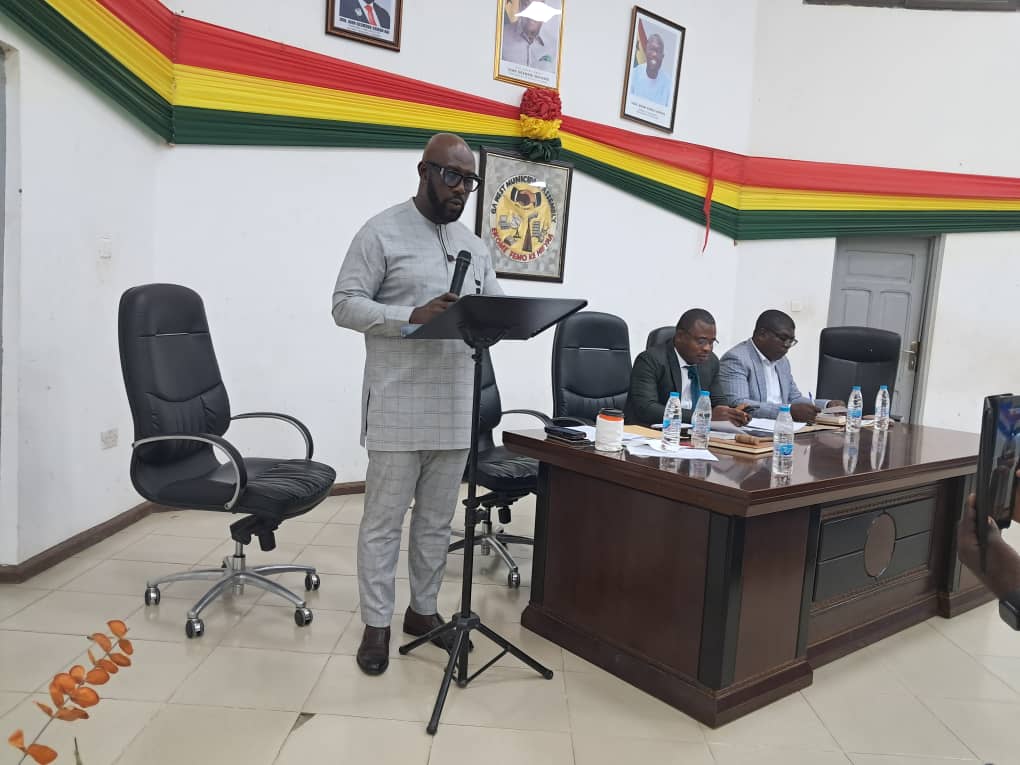+233 (0) 303 970 273 info@gawest.gov.gh GW-0007-2370
+233 (0) 303 970 273 info@gawest.gov.gh GW-0007-2370


The Ga West Municipal Assembly has held its 1st Ordinary Meetings of the 2nd Session of the 9th General Assembly Wednesday 30th and Thursday 31st July at the Assembly Hall, deliberating on how to bring about massive transformation to the municipality.
Hon. John Desmond Sowah Nai, the Municipal Chief Executive of Ga West during his maiden sessional address which is in line with Section 28(1) and (2) of the Local Governance Act, 2016 (Act 936), offered a comprehensive account of the Assembly’s performance over the first half of the year 2025 and outlined the Assembly’s future development strategies.
The MCE began by expressing his gratitude for the Assembly’s confidence in him and emphasised on collective responsibility and teamwork as the foundation for effective local governance. He quoted Mother Teresa and President John Dramani Mahama to reinforce the principles of unity, respect, and people-centred leadership and urged the assembly members to rise above partisan interest.
Human Resource and Administration
The MCE identified systemic inefficiencies within the Assembly's administrative structure. To address this, the Internally Generated Fund (IGF)-funded staff audit has been commissioned to assess staff relevance and performance. Key administrative reforms include Realignment or retraining of redundant staff, institutionalisation of a performance management system, capacity-building in industrial-supportive skills, and acceleration of digital transformation for transparency and efficiency.
Finance and Financial Management
On revenue performance from January–June 2025, a total of ¢10,734,901.80 revenue has been mobilised representing 46.51% of the annual target. On IGF performance, ¢3,905,031.26 which is 47.3% of the IGF target has been mobilised. According to him, notable revenue shortfalls were recorded in rent and rates.
He emphasised that IGF Challenges include inadequate vehicles and personnel, delays in commission payments to contractors, and weak enforcement systems.
Strategic interventions include acquisition and rehabilitation of vehicles, technology integration for billing and monitoring, Community sensitisation and PPPs for infrastructure.
The Assembly’s expenditure Performance has a total of ¢10,464,739.00 representing 45.34%. He stressed that Only 7.44% of IGF was allocated to capital expenditure which is below the statutory 20% minimum.
He said the Assembly’s planned financial reforms include to increase IGF capital investment to at least 25%, to prioritise community projects and reduce administrative overheads.
Urban Roads
Acknowledging the poor road conditions which is 95% earth/gravel, the MCE said the Assembly’s engagement with the Ministry of Roads and Highways has led to the commencement of major road rehabilitations for instance the Amasaman–Ashalaja road and the Pokuase–Katapor road. DRIP equipment deployment and IGF funding are also being explored for sustained road maintenance and Private sector partnerships are being sought for road development.
Development Planning and Infrastructure
According to him, key projects Include:
Market: 24-hour Model Market at Ga Odumase.
Health: Expansion and upgrades of Kotoku, Obeyeyie, Korleyman, and Odumase health facilities.
Education: New and ongoing school infrastructure projects across the municipality, Distribution of over 2,000 units of furniture to public schools.
Water and Sanitation: Drilling and mechanisation of boreholes in various communities, Rehabilitation of 60 faulty boreholes.
Administration: Renovation of NADMO-ICT Block, Social Welfare and Community Development offices.
Social Welfare and Protection
Achievements: Support for Persons with Disabilities in education and medical aid, 340 family case resolutions, and 15 missing children reunited with their families. Monitoring of Day Care and Residential Homes which covered 1,200 children and Community training programs for economic empowerment.
Security: Amasaman District Police Command maintained regular patrols, established six checkpoints, and intensified public education. Total recorded crimes from January–June is 1,575. Robbery trends persist, with logistics and personnel shortfalls being major challenges hence a call for Assembly support in logistics and fuel provision.
Immigration
Honourable Sowah Nai stated that there are 5,000 non-Ghanaians in the Municipality with 50% undocumented. However, challenges include ack of detention facilities, vehicle shortages, and landlord non-compliance. Ghana Immigration Service calls for Assembly support and increase collaboration.
Education
Monitoring and support activities include School reopening inspections, lesson supervision, and sanitation checks. Inclusive education and girl-child protection initiatives, Coordination of sports and counselling activities.
Current statistics: 79 public basic schools, 299 private schools, 2 SHSs, over 80,000 learners in total. Persistent logistical and funding challenges remain.
Environmental Sanitation
The MCE mentioned that the estimated annual refuse generation in the Municipality is 77,112 tons with 65% collected. 14 waste contractors have been engaged, with a growing reliance on informal waste collectors.
On planned interventions, more waste containers, review and replacement of underperforming contractors, deployment of six Borla taxis, establishment of a Sanitation taskforce and public campaigns.
In the MCE's Concluding remarks, he reaffirmed the Assembly’s vision of becoming a well-developed municipality with improved living standards for all. He committed to aligning local goals with the national “Reset Agenda” to rebuild and reform the economy through inclusive growth. He called on all stakeholders to work with renewed unity, purpose, and integrity.
Source: Rachel Sarpong, ISD
Dorcas Asantewaa Osei, ISD.
©Copyright 2025 Ga West Municipal Asssembly. All rights reserved. Developed by Akorsetec